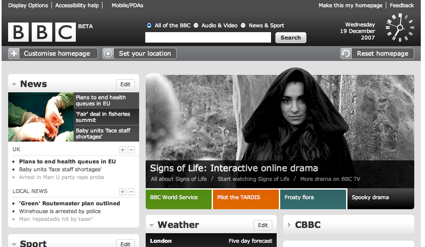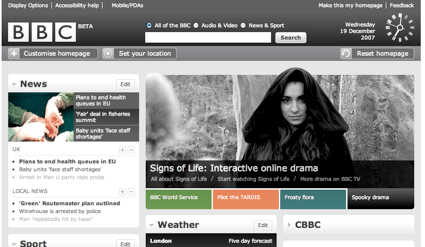Tag: Web
BT trialled 'potentially illegal' ad system claims digital rights lawyer
We have covered Phorm previously – it’s a system of advertising based on web habits, currently causing a stir because of privacy issues. And even more so now, with the news that BT trialled a prototype version in 2006/2007 without informing its customers…
Opinion: Is it time for YouTube to be regulated?
Jonathan Weinberg writes… Regulation? On the web? You must be thinking I’ve swallowed some happy pills to make a statement like that. After all, the whole premise of the Internet has always been find anything you want, anywhere – hasn’t it?
But while it’s near on impossible to bring in blanket rules and laws to cover the whole of cyberspace, I do think it is time some sites were forced to put their hands up and take much more responsibility for their actions – and that starts with YouTube.
A poll out today found YouTube is the most popular user-generated site in the UK after attracting 10.4 million people in January. That is a 56 per cent increase in traffic compared to 2007 and just shows the reach it has.
The success of the video-sharing site has been phenomenal. Such fast growth over the years undoubtedly causes problems and makes it difficult for any company to keep up with the demands of hosting such a vast wealth of moving images…
All-knowing ISPs may start advertising to you based on how you surf
 It would be naïve to think that your Internet Service Provider (ISP) doesn’t hold an incredible amount of information about you. Unless you’re incredibly stealthy / geeky, they have access to every web site you view, every email message you send, every instant messaging conversation you hold… well I could go on, but you get the idea.
It would be naïve to think that your Internet Service Provider (ISP) doesn’t hold an incredible amount of information about you. Unless you’re incredibly stealthy / geeky, they have access to every web site you view, every email message you send, every instant messaging conversation you hold… well I could go on, but you get the idea.
Now, a formula: ISP with a lot of personal information about you + ISP wanting to make more money = showing you targeted advertising while you use the Internet.
In reality, some ISPs have probably already been sharing bits of your data with other companies, but now a company called Phorm wants to insert relevant ads as you surf.
New web start-up YouNoodle dashes/boosts the hopes of other web start-ups
 YouNoodle! YouNoodle! If this start-up doesn’t do well based purely on that name, there’s no hope for any of us.
YouNoodle! YouNoodle! If this start-up doesn’t do well based purely on that name, there’s no hope for any of us.
The NY Times has championed the ‘start-up predictor’ in a recent article on the founders, two former Oxford University students in Silicon Valley, who claim they can sort the wheat from the chaff and determine exactly which start-up ideas will succeed, and which…
Web plagiarism a serious problem in schools (and also on the internet)
 LONDON (Reuters) – More than half of teachers in a survey said they thought plagiarism from the Internet is a problem.
LONDON (Reuters) – More than half of teachers in a survey said they thought plagiarism from the Internet is a problem.
Some students who steal essays wholesale from the Web, they said, are so lazy they don’t even bother to take the adverts off the cut-and-pasted text.
Fifty-eight percent of the teachers interviewed in the Association of Teachers and Lecturers (ATL) questionnaire had come across plagiarism among their sixth-form pupils…
Shiny Review: BBC's "tenth anniversary" home page

To mark the BBC’s tenth anniversary online, they’ve revamped their online presence with the introduction of a new beta version of their home page.
Labelled “BBC Beta”, which is a little concerning as it sounds as if the whole of the Corporation is now in test mode, the new front page offers an iGoogle-style interface which is customisable with various content widgets.
It’s possible to choose to display a range of excerpts of the BBC’s content, including local, national, and world news, TV and radio listings, sport, weather, blogs, entertainment, and history.
Make the new Britney Spears video yourself on MTV
 YOU WILL NEED: One fat man in drag, two sobbing children dressed in sackcloth, a few bottles of prescription medication, some very cheap wigs and 25 extras to act as paparazzi photographers.
YOU WILL NEED: One fat man in drag, two sobbing children dressed in sackcloth, a few bottles of prescription medication, some very cheap wigs and 25 extras to act as paparazzi photographers.
Although it’s actually not that creative. From today, MTV users can remix and edit a video for Britney’s new single ‘Piece of Me’ (maybe in 1999…
UK "big three" broadcasters to launch on-demand video service
BBC Worldwide, ITV, and Channel 4, have today announced that they are set to launch a joint on-demand video service, offering a wide variety of both current and archival programming, next year. With a working title of "Kangaroo", the service…
Vinton Cerf, founding father of the internet, wants to send his baby into space
 Say hello to Vinton Cerf, everyone. This old geezer claims he invented the internet, and is now throwing a strop due to earthlings being the only lifeform able to access the internet – he’s now thinking outside the
Say hello to Vinton Cerf, everyone. This old geezer claims he invented the internet, and is now throwing a strop due to earthlings being the only lifeform able to access the internet – he’s now thinking outside the box world and into the universe.
Cerf recently spoke at a conference in Seoul, South Korea, and expressed his desire for the world wide web to be accessible in space. He’s already started working with a bunch of boffins, namely engineers at a Jet Populsion Laboratory, creating…
Opinion: Why Gordon Brown, Dr Tanya Byron and the Nanny State should stay out of technology
 When does a Government go too far in a bid to protect its citizens? When it locks people up without a charge? When it bans people from taking to the streets and puts them under curfew? Or when it employs a TV presenter to look at how the Internet and computer games are harming the nation’s youngsters?
When does a Government go too far in a bid to protect its citizens? When it locks people up without a charge? When it bans people from taking to the streets and puts them under curfew? Or when it employs a TV presenter to look at how the Internet and computer games are harming the nation’s youngsters?
This week it’s been announced Dr Tanya Byron – star of such TV greats as House of Tiny Tearaways – is to preside over a review of what effect the web and console adventures are having on kids across Britain. And I for one find it not only laughable, but downright disgusting that Gordon Brown and his cohorts think they have the right to interfere in our lives which such a pointless exercise…
















